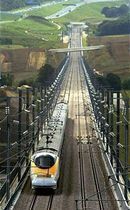 The government release a claim that HS2 will bring 40,000 new jobs. They are so
desperate to let the public know that figure they breach proper practice by briefing it ahead of the publication of the consultation document.
The government release a claim that HS2 will bring 40,000 new jobs. They are so
desperate to let the public know that figure they breach proper practice by briefing it ahead of the publication of the consultation document.
When the consultation document comes out, I will look at whether creating that number of jobs is actually impressive, for an investment of £17 billion. The wider economy produces four times as many jobs per pound of capital, so it actually doesn’t look very impressive at all.
Professor David Begg, eminent representative of an endangered quango, is furious though. He attacks me for making an unfair comparison. The 40,000 figure might be much higher if the new high speed rail line yields the transformative economic results claimed in the business case. And we shouldn’t be talking about jobs anyway, after all:
“We don’t appraise the value of, say, spending money building a new hospital only on the basis of the number of new nurses and doctors it will employ and nothing else.”
Absolutely. So it would be great if the government and other proponents of the line would stop making facile claims about jobs created and focussed on the substantive debate over high-speed rail’s business case. Until they do, there is nothing unfair at all about testing the government’s claims about the number of jobs high-speed rail will create against the number of jobs produced by other investments, as we did in our research note. We aren’t going to disarm unilaterally.
Looking at that wider business case, and the cost-benefit ratio claimed, the weaknesses of high speed rail are just as clear. Even if the £2.60 of benefits for every £1 spent claim were accurate, it wouldn’t be that impressive. It is way below the cut-off point for road schemes. It is also lower than more affordable options to get the rail capacity we need, if they are compared fairly.
That 2.6 ratio isn’t remotely credible though. It relies upon absolutely heroic assumptions. Two key examples:
1) The original business case relied upon an incredible 267 per cent rise in demand. The projection is a bit lower in the consultation document in the short term but, to make up for that, it is being extrapolated further into the future, to 2043 instead of 2033. That is utterly absurd for a simple, fixed elasticity model. Senior figures in the transport industry like Sir Rod Eddington have previously worried about using such a model for forecasts more than 10 years in the future.
2) The analysis assumes people do nothing useful on board trains. I.e. that every minute saved on the journey is a complete minute of additional productive time that would otherwise be completely wasted. The reality is obviously that lots of people work on the train, and are able to do so more and more productively with laptops, smartphones and wireless Internet connections. Even those who just eat or have a cup of coffee are getting some productive use of their time. Adjusting just this one assumption to be more realistic would destroy the case for HS2.
They also compare an alternative with no additional capacity or other improvements apart from those already planned over the next few years. For forecasts through to 2043 that is obviously not appropriate. There are other options that are far more affordable, provide all the capacity needed until 2043 and produce less overcrowding than HS2, on the Department for Transport’s figures.
Marginal improvements in the journey time on an already fast and frequent service won’t have a dramatic economic effect. Madrid to Barcelona took seven hours and high speed rail cut the journey time to less than three hours. There just aren’t the same kind of gains to be had here as the existing service is better and the journey is shorter as we live in a smaller country.
With a business case so desperately weak, it’s understandable that the Government have retreated to even weaker claims about the number of jobs the scheme will create. It is unfair and deeply misleading for Professor Begg to criticise us for responding when they do.
Spending £1,000 per household on HS2 is a major investment and there is every reason to think the line will be a huge white elephant. Proper scrutiny of the plans is essential. That which has been conducted to date suggests that the government should cancel the project.
Matthew Sinclair is the Director the Taxpayers’ Alliance






Comments